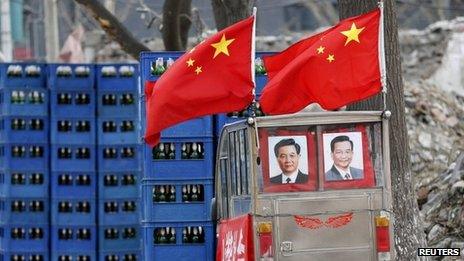What did Hu Jintao and Wen Jiabao do for China?
- Published

A decade ago, immediately after Hu Jintao had been appointed Communist Party leader, he went down to a village in Hebei.
Making such a place the destination for one of his earliest "investigative inspections" was interpreted as an attempt to reconnect with the party grassroots, and to demonstrate that the new leadership were earnest in wanting to do something about inequality.
Inequality was seen as being something that had been rising over the previous decade as the country emerged even further from its state-led economic model of the past and was getting close to unsustainable levels.
In 2013, when we look back at the Hu and Wen period, we can see that this aspiration was bold, and no doubt well-meant, but China is as unequal a place now as it was then.
The best that can be said for Mr Hu and his premier, Wen Jiabao, is that in their final three years in power, the country stabilised inequality even if it didn't reign it in.
But the grand talk at one party meeting in 2005 of moving towards addressing broader development objectives as opposed to narrowly economic ones looks misplaced now.
Growth first
As Mr Hu retires from public life in China, this failure to do much about such a critical area raises the more general question of what, in the end, his achievement really was.
Answering this is not easy. The things that he did were the results of painstaking political work and administrative patience.
This crucial but unexciting stuff usually fails to excite anyone, even historians.
In the long term therefore we may well view the Hu and Wen period as a great success. It made China a truly wealthy and significant country, saw off the threats of the economic crisis in 2008, and managed to build up national esteem and importance.
The political elite remained unified enough to see through a tricky leadership change, despite needing to sacrifice one of their members - Bo Xilai.
Mr Hu was able to create consensus over this period and to maintain the Party's privileged place in society.
Mr Hu and Mr Wen were also able to maintain growth over this period in ways which were indisputable and visible.
China is now four times larger as an economy than it was in 2002. It has risen on almost every major indicator. It is an economic superpower, whatever its geopolitical status.
Those who travel through China today see a country almost awash with activity, from infrastructure to housing, to rising car usage, to the emergence of a middle class in the main cities as consumption-driven as anywhere else on the planet.
Consensus builder
Mr Hu and Mr Wen also presided over an era of crises which they were able to manage and contain.
They dealt with the snow storms of early 2008, the impact of the collapse of exports in 2009, the uprisings in Tibet and Xinjiang in 2008 and 2009 respectively, and the scandal around the fall of Bo Xilai and his wife in 2012.
Through all this, Mr Hu was the great consensus builder, almost pathologically tedious in his public statements, but someone amorphous enough in their public persona to never side too obviously with any group in the party against another so that it risked causing schism.
Mr Wen performed the function of faithful implementer, the reassuringly human face of the modern Chinese elite, holding the banner of reform up towards the end in ways which granted hope, even though they lacked practical details.
But in terms of a single historically significant event in this period, something like entry to the World Trade Organization in 2001 under the previous leaders, the Hu and Wen period is oddly sparse.
The Beijing Olympics was important at the time - but securing it was the achievement of Jiang Zemin.
There were no mould-breaking moves in terms of domestic reform, no rolling out of village elections to a higher level in government, no bold changes in terms of rule of law, nor of the military or the government system.
Plenty of smaller changes, consistent with a cautious leadership, but nothing that stands out as a genuinely historic legacy.
The great contradiction of the Hu and Wen period is that, at a time of immense dynamism and change within China socially, economically, and technologically, the politicians proved themselves eerily faceless and, more often than not, absent. China was changing, whether they were there or not.
Missed opportunity?
Perhaps the single achievement that Mr Hu really expended personal political capital on was the dramatic improvement in relations with Taiwan on the re-election of the Nationalist Party there from 2008.
The symbolic importance of signing of a major quasi-free trade deal in the form of the Economic Cooperation Framework Agreement in 2009 was immense, despite the lack of tangible results in terms of cross-strait trade.
In leading however to direct air, postal and tourist links, this agreement and Mr Hu's leadership have done more to normalise the relationship than previous leaders. It is here that Mr Hu personally has some claim to historic leadership.
Paradoxically, Mr Hu, who often came across as a highly controlled and a controlling political personality, may find that his legacy lies in the hands of his immediate successors.
If they are able to address the long menu of internal reforms in the areas of law, politics, administration and civil society, which he and Mr Wen seemed so reluctant to hit head on, then the Hu-Wen strategy of growth first, political and social change second, will have been proved the correct one.
But if the ensuing decade proves unstable and leads to party division, then the Hu-Wen period will be judged a missed opportunity.
For the next few years, the court will be out. But the judgment might come through quicker than Mr Hu, Mr Wen or anyone else might imagine.